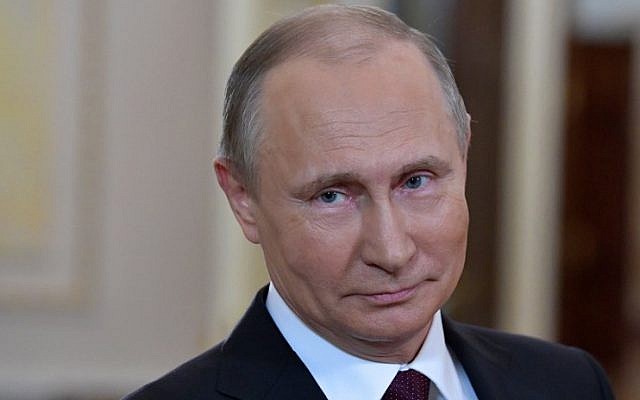Putin suggests ‘Jews with Russian citizenship’ behind US election interference
Russian president ‘couldn’t care less’ if his citizens involved in efforts to influence 2016 vote, says actions cannot be tied to Kremlin
WASHINGTON — Russian President Vladimir Putin said in an interview with the NBC network over the weekend that Russians who sought to influence the results of the 2016 presidential elections could have been “Jews, but with Russian citizenship.”
In the interview, a full transcript of which was released by the Kremlin on Saturday, the Russia president said “I do not care at all, because they do not represent the government.
“Maybe they are not even Russians, but Ukrainians, Tatars or Jews, but with Russian citizenship, which should also be checked; maybe they have dual citizenship or a green card; maybe the US paid them for this. How can you know that? I do not know either,” he said.
Putin insisted such efforts could not be tied to the Kremlin.
“Why have you decided the Russian authorities, myself included, gave anybody permission to do this?” Putin asked in the often-combative interview.
Special Counsel Robert Mueller is conducting a wide-ranging investigation to determine whether President Donald Trump’s campaign colluded with Moscow to help elect him.
Last month Mueller indicted 13 Russian nationals and three Russian companies for allegedly backing Trump’s campaign, maligning his Democratic rival Hillary Clinton and engaging in other election interference.
“So what if they’re Russians?” Putin said of the allegations.
“There are 146 million Russians. So what?… I don’t care. I couldn’t care less… They do not represent the interests of the Russian state.”
Mueller issued a 37-page indictment against the Russians but Putin indicated he has seen no evidence thus far that the alleged meddling broke any US law.
“Are we the ones who imposed sanctions on the United States? The US imposed sanctions on us,” he said.
“We in Russia cannot prosecute anyone as long as they have not violated Russian law… At least send us a piece of paper… Give us a document. Give us an official request. And we’ll take a look at it.”
America’s leading intelligence agencies concluded last year that Putin himself had directed a broad intelligence effort to influence the US election to undermine Clinton’s campaign and boost Trump’s chances, but Trump has repeatedly denied colluding with Moscow.
The Russian leader also rejected those assessments.

“Could anyone really believe that Russia, thousands of miles away… influenced the outcome of the election? Doesn’t that sound ridiculous even to you?” Putin asked.
Deputy Attorney General Rod Rosenstein, when he announced the Russian indictment, said it made no judgment on whether the alleged Russian propaganda campaign altered the outcome of the election which Trump won.
“It’s not our goal to interfere. We do not see what goal we would accomplish by interfering. There’s no goal,” Putin said.
Trump himself has repeatedly shied away from condemning Russia over the alleged meddling.
US intelligence chiefs last month said Russian attempts to meddle in US politics are continuing unabated — and pose a threat to mid-term congressional elections in November.

No comments:
Post a Comment